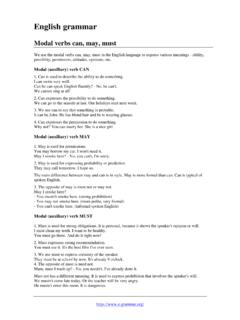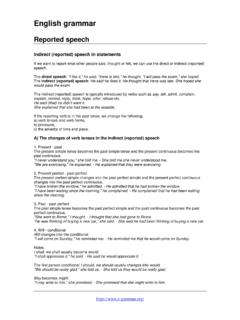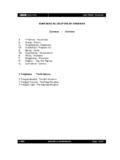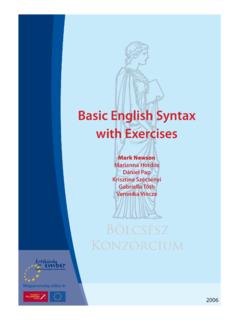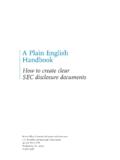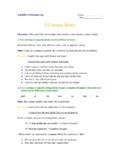Transcription of Basic English Grammar Book 2 - Mark's ESL
1 Lessons are tightly focused on core concepts of Grammar More than 80 practice exercises are included for readyreinforcement A wealth of examples are provided on every topic Concise explanations are bolstered by extra grammartips and useful language notesBeginning to intermediate students of all ages will greatlybenefit from a clear understanding of English grammarbasics. This is the ideal supplement to your language artsprogram whether your students are native English speakers orbeginning English language learners. Skill-specific lessonsmake it easy to locate and prescribe instant reinforcementor ENGLISHGRAMMARBASIC ENGLISHGRAMMARBASIC ENGLISHGRAMMARBASIC ENGLISHGRAMMARBASIC English Grammar Book 2 Book2 Book2 Book2 Book2 Howard SargeantBook2 Copyright 2007 by Saddleback Educational Publishing.
2 All rights reserved. No part of this book may be reproduced in any form or by any means, electronic or mechanical, including photocopying, recording, or by any information storage and retrieval system, without the written permission of the 1-59905-203-2 Printed in the United States of America13 12 11 10 09 08 07 Three WatsonIrvine, CA 92618-2767 Web site: published in the United States by Saddleback Educational Publishing, 3 Watson, Irvine, CA 92618 by arrangement with Learners Publishing Pte Ltd, Singapore Grammar is a very old field of study. Did you know that the sentence was first divided into subject and verb by Plato, the famed philosopher from ancient Greece?
3 That was about 2,400 years ago! Ever since then, students all over the world have found it worthwhile to study the structure of words and sentences. Why? Because skill in speaking and writing is the hallmark of all educated by lesson, this book provides Basic instruction in the eight parts of speech nouns, pronouns, verbs, adjectives, adverbs, prepositions, conjunctions, and interjections as well as the standard patterns of English students of English , be they native speakers or those who are studying English as a second language, will profit from the fundamental introduction and review of Grammar provided by SADDLEBACK'S Basic English Grammar 1 and 2.
4 Helpful marginal notes throughout the books have been provided to reinforce existing skills and call attention to common problem wish you every success in your pursuit of English to the Studentfrom the Publisher What you ll find in this book 1 Nouns 7 23 Common Nouns 7 Proper Nouns 8 Singular Nouns 11 Plural Nouns 11 Collective Nouns 17 Masculine and Feminine Nouns 20 The Possessive Form of Nouns 22 2 Pronouns 24 31 Personal Pronouns 24 Reflexive Pronouns 26 Possessive Pronouns 27 Demonstrative Pronouns 27 Interrogative Pronouns 28 Indefinite Pronouns 28 3 Adjectives 32 43 Kinds of Adjectives 32 The Order of Adjectives 33 Adjective Endings 35 Describing What Something Is Made of 37 The Comparison of Adjectives 39 Adjective Phrases 42 4 Determiners 44 51 The Articles 44 Using Nouns without Articles 45 Demonstrative Determiners 46 Quantifying Determiners 47 Interrogative Determiners 49 Possessive Determiners 49 Numbers 50 Using Determiners Together 50 5 Verbs and Tenses 52 87 Subject and Verb Agreement 52 Transitive and Intransitive Verbs 55 The Simple Present Tense 58am, is and are 59there is and there are 60 The Present Progressive Tense 63 The Simple Past Tense 65was and were 66 Irregular Verbs 67 The Past Progressive Tense 70have.
5 Has and had 71 The Present Perfect Tense 73 Irregular Past Participles 73 The Future Tense 77do, does and did 80 The Infinitive 83 The Imperative Form of Verbs 84 Gerunds 85 6 Auxiliary Verbs 88 94can and could 88will and would 89shall and should 89ought to 90must 90may and might 90 Verb Phrases 91 7 Adverbs and Adverb Phrases 95 100 Adverbs of Manner 95 Adverbs of Time 96 Adverbs of Place 96 Adverbs of Frequency 97 Adverbs of Duration 97 Adverbs of Emphasis 98 8 Prepositions and Prepositional Phrases 101 108 Preposition or Adverb? 101 Prepositions of Place 102 Prepositions of Time 102 Prepositions of Direction 103 Prepositions with Special Uses 103 Prepositions with Adjectives, Verbs or Nouns 105 9 Conjunctions 109 117and.
6 But and or 109 Conjunctions Linking Phrases 110 Conjunctions with Lists 110 Conjunctions That Join Sentences 111 Other Words for and 111 Other Words for but 112 Other Words for or 112 Conjunctions of Time 113 Conjunctions of Place 113 Conjunctions of Reason 114 Conjunctions of Purpose 11410 Sentences 118 133 Four Kinds of Sentence 118 Sentences with Objects 119 Verbs with Two Objects 120 Verbs with No Object 120 Simple Sentences 123 Compound Sentences 123 Conditional Sentences 124 Positive and Negative Sentences 124 Questions 128 Question Tags 13011 Direct and Indirect Speech 134 139 Direct Speech 134 Indirect Speech 134 Indirect Commands 135 Indirect Questions 13612 Punctuation 140 148 Punctuation Marks: period, comma, question mark, exclamation point, apostrophe, quotation marks, colon 140 Capital Letter 144A List of Irregular Verbs 149 152 There are two main types of nouns: common nouns and proper Nouns Words for people, places and things are called common nouns.
7 These common nouns are words for chair hammer bicycle truthpen table saw ship calculatorcrayons sofa axe truck televisionpencil loyalty drill ferry fridgebook lamp ladder train cookerdictionary carpet lawnmower bus computercourage telephone spade laziness printer These common nouns are words for animals. Notice that special names for young animals are its youngdog puppycat kittencow calfhorse foalsheep lambgoat kidfrog tadpole These common nouns are words for airporthotel gas stationlibrary parkmuseum farmmall zootheater factoryhospital nursery animal its youngfox cubelephant calfkangaroo joeybear cublion cubtiger cubwhale calfschool post officeuniversity police stationoffice restaurantmosque supermarkettemple stadiumshop synagoguegym church1 Nouns1 Nouns These common nouns are words for people who do certain manager sailor gardenerdancer secretary pilot police officerartist teacher driver plumberphotographer doctor writer farmermagician
8 Dentist friend clerkathlete lawyer brother technicianProper NounsThe names of particular people, places and things are proper nouns. They always begin with a capital letter. These people s names are proper Hood Florence Nightingale Mom Miss ParkAladdin Muhammad Ali Dad Mrs. TaylorFrankenstein George Washington Granny Mr. YoungHarry Potter David Beckham Grandad Dr. LeeSanta Claus Julia Roberts Uncle David Professor RajMahatma Gandhi Nelson Mandela Aunt Diana JoseConfucius Alex Rodriguez Ms. Hall Yang Ming The names of the days of the week and the months of the year are proper nouns. days of the week months Monday January July Tuesday February August Wednesday March September Thursday April October Friday May November Saturday June December Sunday Nouns: Proper NounsAUGUSTS unday 4 11 18 25 Monday 5 12 19 26 Tuesday 6 13 20 27 Wednesday 7 14 21 28 Thursday 1 8 15 22 29 Friday 2 9 16 23 30 Saturday 3 10 17 24 31 Nouns.
9 Proper Nouns The names of special days and celebrations are also proper Year s Day Veterans' DayMother s Day ThanksgivingIndependence Day Memorial DayValentine s Day HalloweenLabor Day ChristmasRamadan Yom Kippur The names of famous places, buildings and monuments are proper Ben the Empire State Buildingthe Sphinx the Taj MahalGraceland the Eiffel Towerthe Grand Canyon the Golden Gate Bridgethe Sydney Opera House the Great Wall of ChinaBuckingham Palace Chaco Canyon Pueblothe Leaning Tower of Pisa the Statue of Liberty The names of people who live in a particular country are also proper people Afghanistan AfghansAustralia Australians Britain the BritishChina the ChineseFrance the FrenchGermany GermansIndia IndiansIndonesia IndonesiansItaly ItaliansJapan the JapaneseKorea KoreansMalaysia Malaysians country peopleSamoa SamoansNew Zealand New ZealandersPakistan Pakistanisthe Philippines
10 FilipinosRussia RussiansNicaragua NicaraguansSouth Africa South AfricansSpain SpaniardsSwitzerland the SwissThailand ThaisUSA AmericansVietnam the Vietnamese 10 Exercise 1 Write each common noun under the correct heading. theater lion father brother doctor restaurant builder stove elephant kangaroo museum library things animals places people Exercise 2 Underline the common nouns and circle the proper nouns in these sentences. 1. I told Uncle John about my accident. 2. Kim and Stephanie wore masks on Halloween. 3. The lawnmower is broken. 4. We re going to the movies tomorrow. 5. The lion is playing with one of its cubs.

